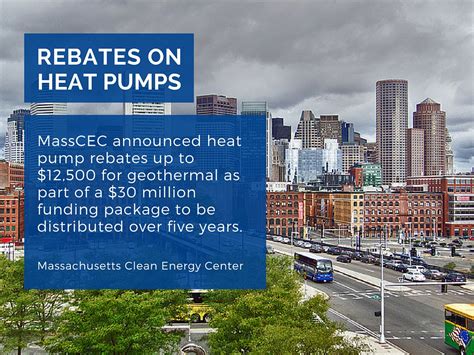In Massachusetts, energy bills can take a substantial bite out of household budgets. With fluctuating energy prices and the growing concern over climate change, many residents are considering alternative solutions to reduce their energy consumption and costs. One of the most effective ways to do this is by investing in heat pumps. The Massachusetts government is keenly aware of this transition and has introduced energy-efficient heat pump rebates to encourage adoption. In this article, we’ll explore what heat pumps are, how they work, the benefits they offer, and how you can maximize savings with available rebates.
What is a Heat Pump?
A heat pump is a versatile device that can provide both heating and cooling for your home. Unlike traditional heating systems that generate heat through combustion or electric resistance, heat pumps transfer heat from one place to another. In the winter, they extract heat from the outside air (even in cold temperatures) and bring it indoors, while in the summer, they do the reverse, extracting heat from indoors and releasing it outside.
Benefits of Heat Pumps
Heat pumps offer numerous benefits, making them an attractive option for homeowners:
- Energy Efficiency: Heat pumps are significantly more efficient than traditional heating systems. They use less electricity to produce the same amount of heating or cooling, which translates to lower energy bills.
- Environmentally Friendly: By using less energy, heat pumps reduce greenhouse gas emissions, helping to combat climate change.
- Year-Round Comfort: Because heat pumps can both heat and cool your home, they offer consistent comfort regardless of the season.
- Low Maintenance: Heat pumps generally require less maintenance compared to conventional systems, which can save you money and hassle over time.
Massachusetts Heat Pump Rebates
The Massachusetts government offers a number of rebate programs aimed at encouraging residents to switch to energy-efficient heating and cooling systems like heat pumps. The Massachusetts Clean Energy Center (MassCEC) and the utility companies in the state have been pivotal in making these programs accessible.
Types of Rebates Available
There are several types of rebates available in Massachusetts:
- Heat Pump Rebates: Homeowners can receive rebates for installing air-source or ground-source heat pumps. The amount of the rebate varies depending on the specific system installed and its efficiency ratings.
- Income-Eligible Programs: Programs designed specifically for low-to-moderate-income households offer enhanced rebates, making it even easier for eligible households to make the switch.
- Home Energy Audits: Before you install a heat pump, consider a home energy audit, which can also qualify for a rebate. Identifying areas where your home is losing energy will improve the effectiveness of your new system.
How to Access Rebates
To take advantage of heat pump rebates, follow these steps:
- Research: Familiarize yourself with the different types of heat pumps available and determine which would best suit your home’s needs.
- Energy Audit: Schedule a home energy audit to assess your current system and receive recommendations for improvement.
- Select a Qualified Installer: Choose a licensed contractor to install the heat pump. Make sure they are familiar with the rebate process and can help you navigate through it.
- Apply for Rebate: Complete the rebate application upon installation and submit it along with your receipts and documentation. Ensure you apply within the specified window to maximize your savings.
Maximizing Your Savings
To truly maximize your savings, consider these tips:
- Choose High-Efficiency Models: The more efficient your heat pump, the higher your rebate and the lower your energy bills will be.
- Utilize Additional Incentives: Check if your local utility company offers additional rebates or incentives on top of state rebates.
- Regular Maintenance: Ensure your heat pump is regularly serviced to maintain its efficiency, thus keeping your energy bills low.
Conclusion
Investing in a heat pump is not only an eco-friendly choice, but it also offers significant potential savings on your energy bills. The Massachusetts heat pump rebate programs provide attractive financial incentives to make the switch easier and more affordable. By understanding the benefits, types of rebates available, and the steps to access them, Massachusetts residents can make informed decisions that can lead to substantial energy savings and a healthier environment.
FAQs
1. How much can I save with Massachusetts heat pump rebates?
The savings vary depending on the type of heat pump you install and its efficiency rating. Rebates can cover a significant portion of the installation costs, so it’s best to check specific amounts through the Massachusetts Clean Energy Center’s website or your utility provider.
2. Are heat pumps suitable for all homes?
While heat pumps work well in most homes, factors such as the home’s insulation and existing heating system can affect their efficiency. A home energy audit can help determine if a heat pump is suitable for your specific circumstances.
3. Do I need to replace my existing heating system to install a heat pump?
Not necessarily. In many cases, heat pumps can be installed alongside existing systems to enhance efficiency. However, a full replacement may yield better results in energy savings and comfort.
4. How long does it take to install a heat pump?
Installation times can vary based on the complexity of the project, but most installations typically take one to three days.
5. Can I still receive a rebate if I do the installation myself?
No, to qualify for rebates, the installation must be completed by a licensed and qualified contractor to ensure compliance with all safety and efficiency standards.
Download Massachusetts Heat Pump Rebates
